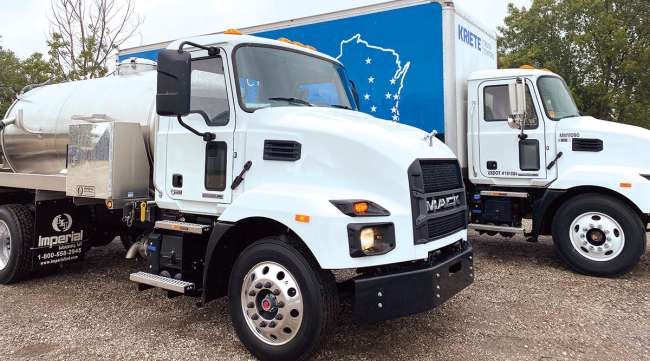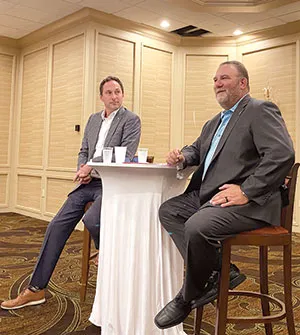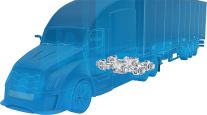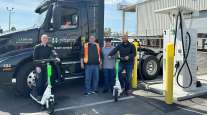Staff Reporter
Excitement Builds for Mack's Medium-Duty Electric Truck

[Stay on top of transportation news: Get TTNews in your inbox.]
ELKHART LAKE, Wis. — Mack Trucks and dealership chain Kriete Truck Centers discussed the encouraging signs they’re hearing from customers about the upcoming full-production rollout of the manufacturer’s first medium-duty electric truck, and it’s a tenor that a Kriete executive said denotes a shift in buyer outlook.
“I think as time has gone on, genuine enthusiasm has started to rise,” said David Kriete, president of Kriete Truck Centers, during a Sept. 26 Mack media event. “A year ago, if you were to ask me that, I would’ve probably smirked and said there’s no chance — because that was the sentiment of most of the folks in the state. But we met with a really big customer not too long ago, and they’re all in.”
That response is also reflected in the truck maker’s order books, said Jonathan Randall, president of Mack Trucks North America. “The response to that truck has been very positive,” he said during a roundtable discussion. “We’ve already sold out the Q4 run, and we’re already scheduling orders now into late Q1 of next year with this truck.”
Kriete noted that the customer discussion he cited marked the first time he’d heard directly from a buyer pushing to electrify. Until now, conversations about EVs have typically occurred with truck manufacturers and centered on determining the timing for when certain investments should happen. Now, Randall said customers are starting to see a use case for electric trucks.

Kriete (left) and Randall discuss the anticipation surrounding the rollout of the Mack MD Electric. (Connor D. Wolf/Transport Topics)
“The response has been very positive from the market because it makes sense,” Randall said. “This is one of those trucks where it actually could be taken as a one-for-one replacement electric to diesel. You don’t need to run more of the electrics to do the same job that the diesels in your fleet would have done.”
Randall added, “It makes sense because it stays within, typically, a small radius, operates in stop-and-go heavy urban environments, comes home to the same depot every night, [and] can get charged.” Kriete agreed that the medium-duty segment is well-suited to EV adoption, as range is less of an issue, and trucks can charge overnight.
Pre-production on the Mack MD Electric truck is launching in the fourth quarter, and serial production is set for next year. The zero-emission model aligns with Mack’s goal of having 35% of its production be zero emissions by 2030. The Mack MD Electric Class 7 has a driving range of 240 miles while, the Class 6 version can be configured to have a range of 150 miles or 240 miles.
Randall stressed that obstacles remain for broader EV adoption, with deployment of charging infrastructure at the top of the list; he said it’s not uncommon for construction and utility approvals on a charging facility to require 18 months of work. Still, he acknowledged that funding is available to help advance the ball.
What does it take to become the best technician in the country? Hear from two experts who supervised the exams at TMCSuperTech. Tune in above or by going to RoadSigns.ttnews.com.
“The money is in the pipeline,” Randall said. “It’s getting spent through grants. It exists. The industry does have a challenge ahead of us. I think that the technology is available and ready. The pacing entity may well be the infrastructure and the ability to handle larger adoption of battery-electric vehicles.”
Range and charging times also need to improve, Kriete noted.
“In the short run, range needs to be overcome,” he said. “Then, I think, the other big one — other than the investment in infrastructure and all that — is charging time. A typical fueling experience is — whatever it takes — 10 to 20 minutes or something. Now, that could look like three to seven hours. How are the fleets going to manage that? That needs to be overcome.”
Kriete also cited an example in which a customer invested the time and attention to incorporate an EV into its operation. About a year ago, he said there was very strong interest from city officials in Madison, Wis. They were looking for ways to put battery-electric vehicles into their fleets. Later this year, the city will add two electric garbage trucks to its operation.
Want more news? Listen to today's daily briefing below or go here for more info:





